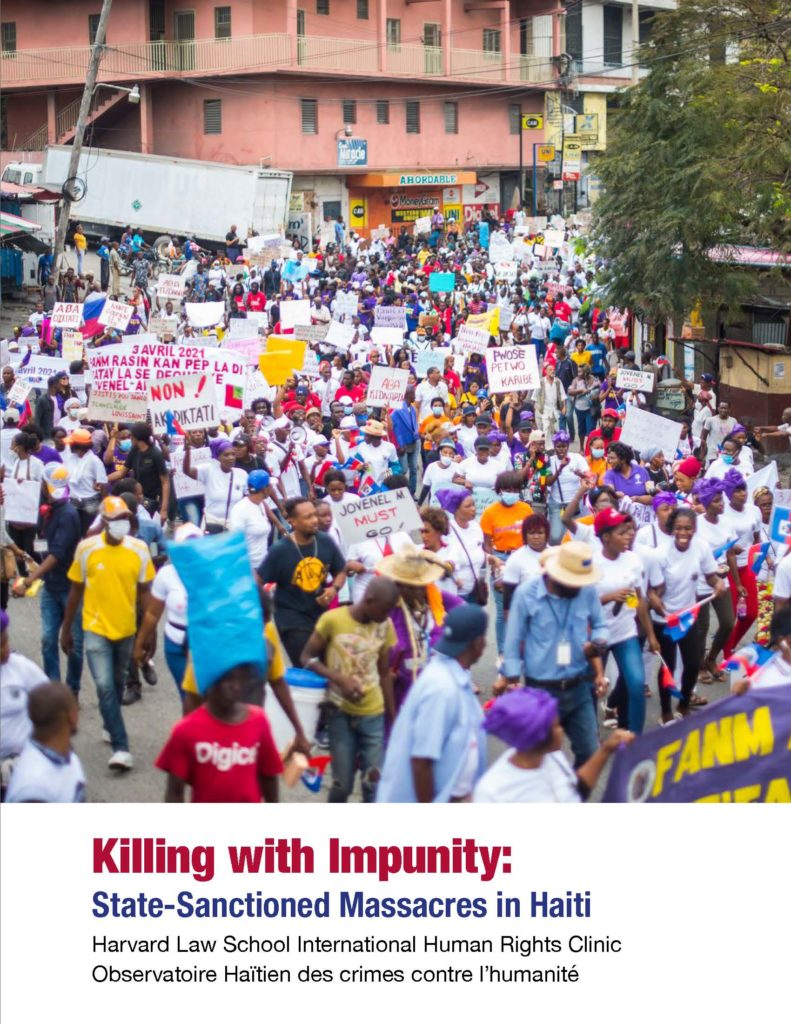via HRP blog
Haitian human rights coalition, Harvard clinic release new analysis of state-sanctioned massacres
(April 22, 2021, Port-au-Prince, Haiti; Cambridge, MA) — Three deadly massacres targeting impoverished neighborhoods in Haiti were carried out with Haitian government support and amount to crimes against humanity, according to a report released today by Harvard Law School’s International Human Rights Clinic and the Observatoire Haïtien des Crimes contre l’humanité (OHCCH). The report points to evidence that the gang-led attacks were resourced and supported by state actors, ranging from high-ranking officials in the Moïse administration to the Haitian National Police.

The report, “Killing with Impunity: State-Sanctioned Massacres in Haiti,” analyzes three attacks that took place between 2018-2020, which have together killed at least 240 civilians. The massacres targeted the Port-au-Prince neighborhoods of La Saline, Bel-Air, and Cité Soleil, which have played a leading role in organizing protests demanding government accountability for corruption and other human rights violations.
“Moïse’s government has been pushing the story that the attacks are merely gang infighting, but the evidence demonstrates high-level government involvement in the planning, execution and cover-up of the attacks,” said Mario Joseph, Managing Attorney of Bureau des Avocats Internationaux, a member organization of OHCCH.
The report relies on investigations by Haitian and international human rights experts that show that senior Moïse administration officials planned the attacks or otherwise assisted by providing the gangs with money, weapons, or vehicles. Off-duty police officers and resources were utilized to carry out the attacks. The Haitian National Police repeatedly failed to intervene to protect civilians despite the sites of the attacks being in close proximity to multiple police stations. In each attack, gangs arrived in the targeted neighborhood, shot at residents indiscriminately, raped women, and burnt and looted houses. The massacres repeatedly involved gangs affiliated with the G9 alliance led by Jimmy Chérizier, which reportedly enjoys government connections.
“We found that Moïse’s failure to stop or respond to attacks initiated by his subordinates may make the President himself liable for crimes against humanity,” said Beatrice Lindstrom, a Clinical Instructor at the Harvard Clinic who supervised the research and drafting of the report. “This should serve as a wake-up call to the international community to stand up for human rights, fully investigate allegations of serious abuses, and do its part to hold perpetrators accountable,” she added.
The report comes amidst a deepening crisis for democracy and human rights in Haiti. Widespread demonstrations have gripped the nation, with large swaths of the population protesting government corruption, rising insecurity, and Moise’s increasingly authoritarian conduct. Notably, to repress dissent, Moise has criminalized common forms of protest and created an intelligence agency to provide surveillance of the political opposition. Attacks against civilians, including the assassination of prominent government critics, have largely been carried out with impunity. Although most experts and much of civil society agree that President Moïse’s constitutional mandate ended on February 7, 2021, he has refused to step down, insisting that an illegal constitutional referendum take place before elections for his replacement.
The finding that the attacks amount to crimes against humanity strengthens the prospects for accountability. In addition to imposing an international obligation on the Haitian government to prosecute the people responsible, it opens the door to prosecutions in national and international courts outside of Haiti. It also means that perpetrators can be pursued indefinitely as no statutes of limitations apply.
“Just like Haiti’s former dictator Jean-Claude Duvalier eventually had to stand trial for his brutal repression decades after he left office, the perpetrators of today’s massacres can no longer escape justice by relying on statutes of limitations,” Joseph added.
The UN has raised alarm that the ongoing lack of accountability for massacres has fostered an enabling environment for further carnage. Yet another attack on Bel-Air earlier this month bore striking similarities to the massacres analysed in the report.
“The attacks covered in the report are particularly severe and well-documented, but they are part of a widespread, systematic campaign of violence and intimidation of political dissidents,” said Pierre Esperance, Executive Director of the Réseau National de Défense des Droits Humains (RNDDH), an OHCCH member that has led independent investigations into repeated attacks on impoverished neighborhoods. RNDDH has documented at least 11 massacres over the course of Moise’s presidency.
The report relies on evidence collected by a range of Haitian and international actors over the last few years and analyzes it under international criminal law. Harvard Law School students Joey Bui JD’21 and Nathalie Gunasekera JD’21 led the research and drafting of the report under Lindstrom’s supervision.
Read the report in English, French, and Haitian Creole.
Filed in: In the News, Legal & Policy Work
Tags: Beatrice Lindstrom, Haiti, HRP, Human Rights Program, IHRC, International Human Rights Clinic
Contact Office of Clinical and Pro Bono Programs
Website:
hls.harvard.edu/clinics
Email:
clinical@law.harvard.edu